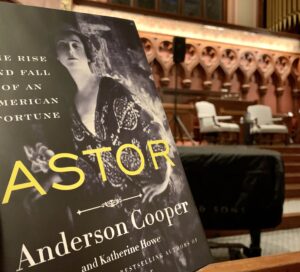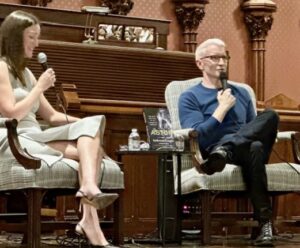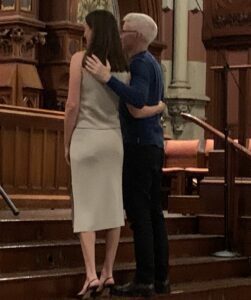Following their success with ‘Vanderbilt’, Anderson Cooper and Katherine Howe have written another book. This time, the salt and pepper duo take on the Astors.
‘Astor’ explores, and in many ways explains, the fascinating place this family continues to hold in American history. It’s also a modern day account of wealth, indulgence and dynastic arrogance.

This book not only reveals the unlikely trail of success and failures within the celebrated family, but can be more broadly interpreted as a cautionary tale of myopic ambition. Almost Greek in it’s chronicle of monumental human foibles, ‘Astor’ is as much a social commentary on a family, as the family of all men.
Synonymous with luxury the name ‘Astor’ is culturally ubiquitous. From subway stations to swanky hotels the moniker has a mystique that transcends the iconic family and their ultimate downfall.
Recently, Cooper and Howe spoke to a full-house at the Old South Church. The sanctuary was filled with proper-Bostonians as eager to learn about the Astors as they were to scope out the chalk-topped, boot-struttin, hunk from New York and the mahogany-haired, kitten-heeled, cutie from Boston’s NorthShore. The team of complimentary talents didn’t disappoint. They were engaging, funny and ohh so thought-filled.

Together Cooper and Howe traced the remarkable life-story of Johann Jakob Astor. With a plan to sell flutes as his livelihood, the ‘Son-of-a-Butcher’ left Walldorf, Germany for London in 1779. Four years later, Johann boarded a ship for America. A chance meeting with a fur-trader lead the newly Americanized John Jacob Astor to envision an alternative career with his young wife. Growing success with trapping beaver and trading pelts consumed the imaginative newlyweds. With blinding ambition and eight children, Sarah and John Astor foresaw converting unsettled parts of the North American continent into~ ‘Astor~ia’, an empire of their own.
Transactional in all things, Astor annexed his steel-trap personality and beaver-pelts into a global trading enterprise. Investing wisely, he amassed a fortune to spend on property around New York. Intellectually boorish and psychologically indifferent, the land-baron’s wealth couldn’t leverage his plan to build Astoria across the continent. Instead, he built countless tenements to house immigrants teaming into Ellis Island. The campaign to shelter the masses had the unintended consequence of metaphorically trapping Astor and future generations of dilettantes into a silo for vapid snobs.
The authors explained, while the family’s legacy was fixed on financial gluttony the Astors were emotionally starved. Miserly and misanthropic they lived lives of conspicuous consumption. Situated in posh-ghettos populated by social-climbing nouveau-riche, John Jacob Astor and his heirs outwardly swaddled themselves in the finest things in life. Inwardly, they had no sociological values.
Isolated by pretense and blind ambition the Astors seldom saw residents of the ramshackled land they owned. Generational progeny convinced themselves their ‘family-money’ would never dwindle. Before it evaporated, extended relations lived in a cultural-cluster-fuck most easily understood as a social vacuum. As the moral of all Greek parables teaches, ultimately time took it’s toll on this legendary family. They couldn’t escape drowning in a sea of inflated egos, greed and lust. ![]()
![]()
The monies they earned while transforming America into a mecca of civilization morally and financially bankrupted the Astors, the way excesses of self-indulgences predictably do.
As America evolved the crown of “Wealthest Man in America” has changed heads multiple times. After the Astors cash was spent, Standard Oil founder John Rockefeller wore the mantle. Tech-titans, Jeff Bezos and Elon Musk wrestle for the title now. The challenge for them, as it will always be, is ‘How to bank wealth with wisdom that leads to social reform and does less transactional harm and more good than ‘Astor’ ever could.

Howe and Cooper end the night at Old South Church in Boston, with a thoughtful spin on ‘Astor’s Place’ in American history.
“Astor” is Winter-Book-Club worthy!

The Chanler, a luxury Boutique Hotel, 117 Memorial Blvd, on Newport’s famous “Cliff Walk” was built in 1873 as a Summer Cottage for John Winthrop Chanler and his wife Margaret Astor Ward. ( great grand-daughter of John Jacob Astor)

Original entrance to the Chanler Summer Cottage

580 Bellevue Avenue in Newport Rhode Island. “Beechwood” was the Gilded Age Summer Cottage built for Caroline Astor in 1853. It’s present owner, Oracle’s Larry Ellison, is converting it and adjacent properties into a home and museum.

2023 construction around Larry Ellison’s “Beechwood” once owned by Caroline Astor


Absolutely fascinating to read/hear about, yet practically unfathomable to all but the privileged few…thank you, She the People, for inviting us to tune in, imagine, and enjoy!